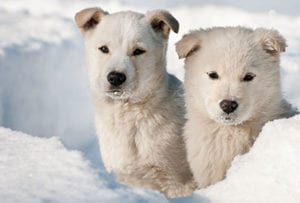What are the two most important things for your pet to have a safe and happy winter?

- Food and Water
Your pet will need to have plenty of fresh water. This is important if you have a dog, a cat or even a horse. Water can freeze quickly outside so check their water source frequently if you have an outdoor pet or if they will be outside for even a short time Pets expend more energy in cold weather so their appetite may increase. It is important to provide access to fresh, nutritious food. - Safe Environment
Outdoor pets need a safe shelter from winter elements like wind and snow. A shed with a warm ground cover like hay, straw or even old blankets or towels will work as long as it is easily accessible. With cats you have to be careful as they seek out warm spots that may be potentially harmful. One favorite hiding spot is under the hood of your car. If the car is started before the cat can escape, they can easily be injured or even killed. Honking the horn or peeking under the hood can help prevent such accidents. Also, make sure to give pets a little extra time to move as cold weather can slow them down.Many inside pets still spend some time outdoors on walks or in the yard. Many of them could benefit from a sweater, coat, or even booties if you can get them to wear them. When bringing your pet back inside, make sure to wipe their paws, legs, and tummies in case they came into contact with common winter chemicals like salt or antifreeze.
Also – Don’t EVER leave your pet alone in the car in the winter. The temperature can drop very quickly and become life threatening. And please watch them closely if you have a heater or fireplace because, just like children, pets can sometimes get too close which may result in burns on their tender paws.
These simple things will help ensure your pet has a safe, cozy and happy winter.

